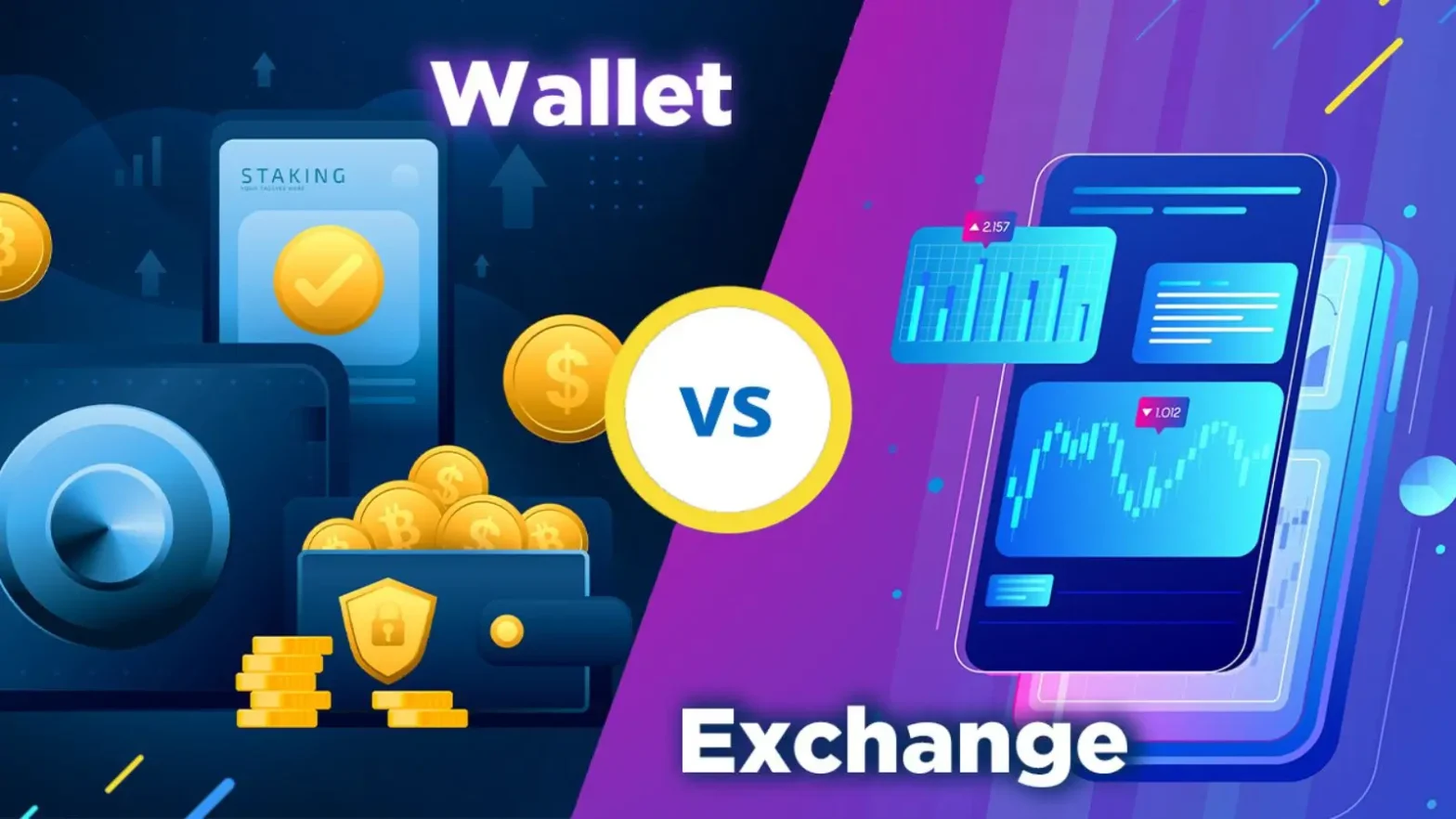If you’re new to the crypto world, you’ve probably come across two common terms: cryptocurrency exchange and cryptocurrency wallet. While they may seem similar—and both are essential to crypto transactions—they serve entirely different functions.
In this guide, we’ll break down the difference between a cryptocurrency exchange and a wallet, explain how they work, list top examples, and help you decide which one you need (or whether you need both!).
What is a Cryptocurrency Exchange?

A cryptocurrency exchange is a digital platform that enables users to buy, sell, or trade various cryptocurrencies, including Bitcoin, Ethereum, and others. Think of it like a stock market, but for crypto. Users can convert fiat currency (such as USD or EUR) to cryptocurrency, or trade one coin for another.
Related: Warning Signs an Exchange is About to Collapse
How Do Cryptocurrency Exchanges Work?
Exchanges function as intermediaries between buyers and sellers. There are two main types:
- Centralized Exchanges (CEX): These are operated by companies and include features like customer support, faster transactions, and more liquidity. However, your private keys are stored by the platform.
- Decentralized Exchanges (DEX): These allow peer-to-peer transactions, and users retain full control of their keys.
Top Crypto Exchanges in 2025
| Exchange | Type | Highlights |
| Binance | Centralized | High liquidity, hundreds of coins, low fees |
| Coinbase | Centralized | Beginner-friendly, based in the U.S., FDIC-insured USD balances |
| Kraken | Centralized | Advanced trading tools, solid security, good for institutions |
| Uniswap | Decentralized | Runs on Ethereum, offers DeFi tokens |
| dYdX | Decentralized | Layer 2 scaling, margin trading supported |
What is a Cryptocurrency Wallet?
A cryptocurrency wallet is a digital tool used to store, receive, and send cryptocurrencies. Unlike exchanges, wallets are not for trading—they are primarily for storing and securing your private keys.
How Do Cryptocurrency Wallets Work?
Crypto wallets work by managing the private and public keys tied to your assets on the blockchain. When you send crypto, your wallet uses your private key to authorize the transaction.
There are two main categories:
- Hot Wallets: Always connected to the internet. Easier to use but less secure.
- Cold Wallets: Offline wallets. Much safer for long-term storage.
Best Crypto Wallets in 2025
| Wallet | Type | Highlights |
| MetaMask | Hot Wallet | Great for Ethereum and DeFi apps |
| Trust Wallet | Hot Wallet | Supports multiple blockchains |
| Ledger Nano X | Cold Wallet | Hardware wallet, secure offline storage |
| Trezor Model T | Cold Wallet | Open-source, secure hardware wallet |
| Exodus | Hot Wallet | User-friendly interface, desktop & mobile support |
Cryptocurrency Exchange Vs Wallet: Key Differences
Here’s a quick side-by-side comparison of the difference between a cryptocurrency exchange and a wallet:
| Feature | Cryptocurrency Exchange | Cryptocurrency Wallet |
| Purpose | Buy, sell, and trade cryptocurrencies | Store, receive, and send cryptocurrencies |
| Control of Private Keys | Platform controls (CEX); you control (DEX) | You fully control (if self-custodial wallet) |
| Security Level | Varies; CEX can be hacked | Higher (especially cold wallets) |
| Ease of Use | Beginner-friendly interfaces on top exchanges | Some wallets can be complex for beginners |
| Internet Connection Needed | Always connected | Not needed for cold wallets |
| Examples | Binance, Coinbase, Uniswap | MetaMask, Ledger, Trust Wallet |
| Main Risk | Hacking risk, custody risk on centralized platforms | Losing private key or recovery phrase |
Do You Need Both a Crypto Exchange and a Wallet?
Yes, in many cases, you’ll need both.
- You use the exchange to buy or trade crypto.
- Then you move your assets to a wallet for secure storage—especially if you don’t plan to trade often.
This two-step approach offers both liquidity and security, allowing you to interact with the market while safeguarding your assets.
FAQs on Wallets Vs Exchanges
Can I store crypto directly on an exchange?
Yes, but it’s less secure than moving your funds to a private wallet. Exchanges have been hacked in the past.
Is a wallet safer than an exchange?
Yes. Wallets (especially hardware/cold wallets) offer much better protection from hacks and phishing.
Which is better for beginners: wallet or exchange?
A centralized exchange like Coinbase or Binance is better for starting out. Once you’re comfortable, move to a wallet for safety.
Do I need internet to use a hardware wallet?
No. Hardware wallets work offline and only connect temporarily for transactions.
Is MetaMask an exchange or a wallet?
MetaMask is a wallet, but it integrates with DEXs like Uniswap to facilitate trades.
Final Thoughts
Understanding how a cryptocurrency exchange is different from a cryptocurrency wallet is vital if you want to protect your investments and make smart crypto decisions.
Exchanges are for buying and trading, while wallets are for storing and safeguarding your digital assets.
Whether you’re a beginner or a seasoned investor, the safest path is to buy on an exchange and store in a private wallet—especially for long-term holds.
🔁Quick Recap:
- Crypto exchanges = buy/sell/trade (Binance, Coinbase)
- Crypto wallets = store/secure/send (Ledger, MetaMask)
- Use exchanges to acquire crypto, then transfer to wallets for storage
- Never leave large amounts of crypto on an exchange
✅ Ready to Start?
Even $10 is enough to get started. Open a Binance account, then secure your assets with a reliable wallet today. Your crypto future begins now—trade smart and store safely!

